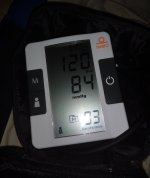@need4tren I invite you - if you so choose (totally fine to ignore) - to make your case here (rather than cluttering luki's thread) for why PK/PD data in research subjects (e.g., Jonklaas, J., Burman, K. D., Wang, H., & Latham, K. R. (2015). Single-Dose T3 Administration. Therapeutic Drug Monitoring, 37(1), 110–118. doi:10.1097/ftd.0000000000000113) is irrelevant to enhanced bodybuilders due to absorption.
My contention is that despite the methods requiring that subjects are fasted, abstain from the use of hormones & vitamins, it does not follow that these factors affect Liothyronine (Cytomel, exogenous T3) absorption
per se.
Are you able to provide any data to support the contrapositive: that being in the fed state, using hormones and/or vitamins (i.e., as an "enhanced bodybuilder"), alters the absorption of, and therefore pharmacodynamic increase to free T3, Liothyronine?



































.gif)














































